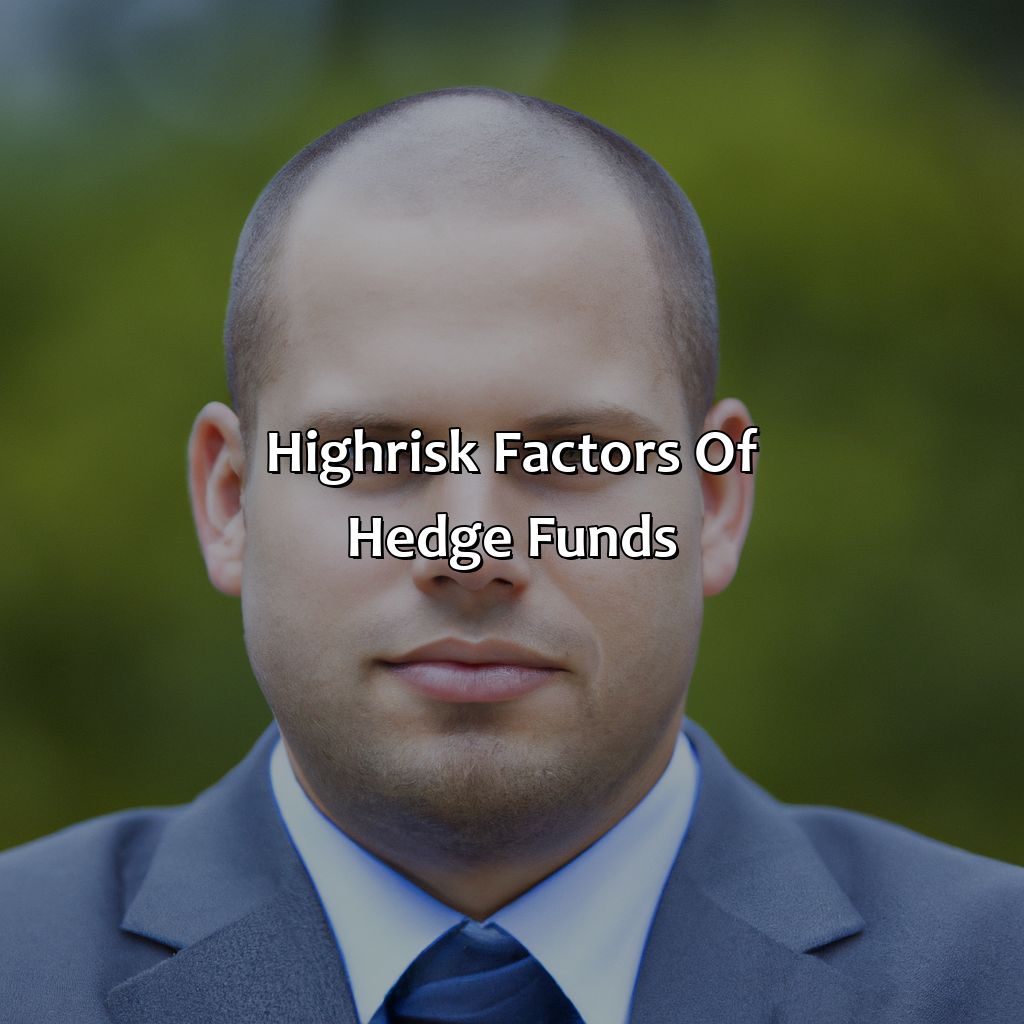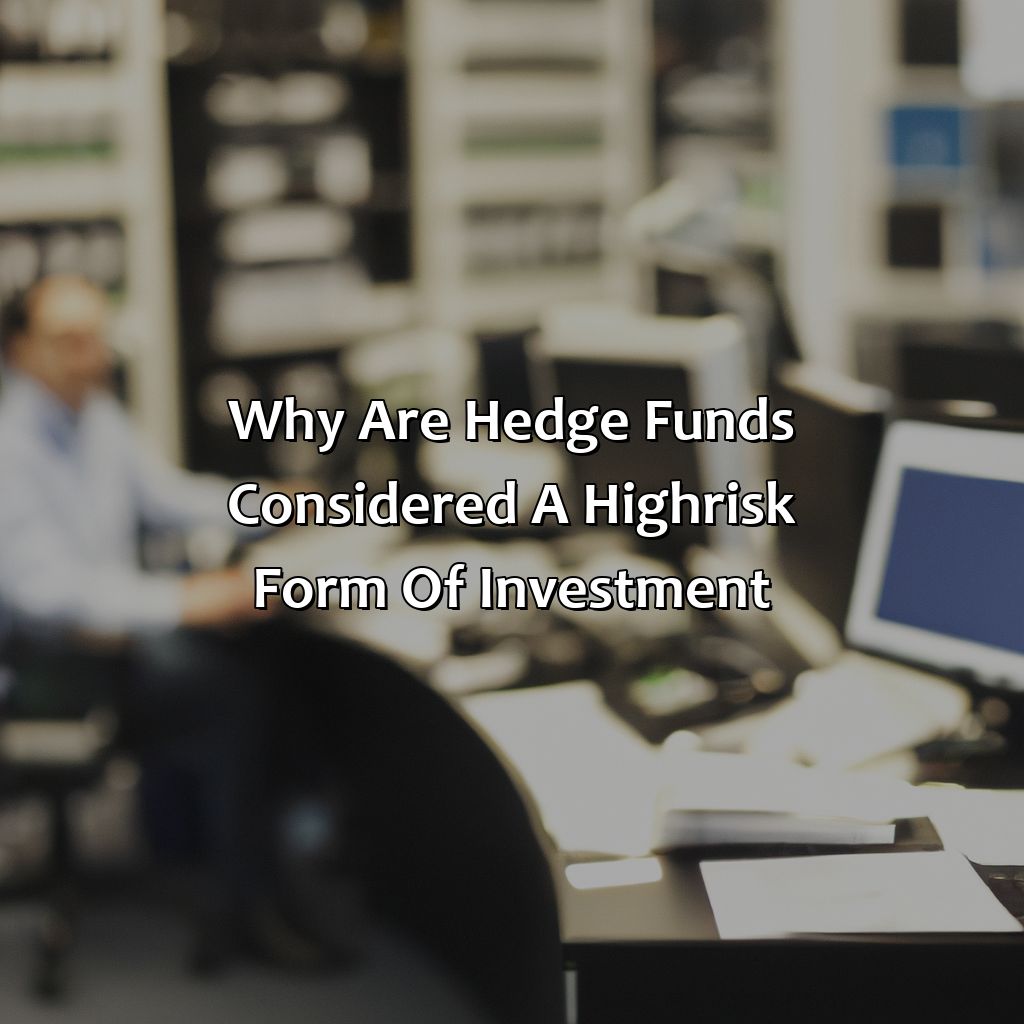Why Are Hedge Funds Considered A High-Risk Form Of Investment?
Key Takeaway:
- Hedge funds are considered a high-risk form of investment due to their use of leverage, illiquid investments, limited regulation, and high minimum investment requirements. These characteristics make them an attractive option for sophisticated investors, but also expose them to substantial risks.
- The high-risk factors of hedge funds include market risk, liquidity risk, credit risk, operational risk, and counterparty risk. Each of these risks carries the potential to cause significant losses to investors, which underscores the importance of careful risk management and due diligence in the hedge fund industry.
- Despite their high-risk profile, hedge funds can also offer the potential for high returns and diversification benefits, which can make them a useful component of a well-diversified investment portfolio. However, investors should be aware of the potential risks involved and carefully consider whether investing in hedge funds aligns with their individual investment objectives and risk tolerance.
Are you considering investing in a hedge fund? Before you make any decisions, it’s important to understand the potential benefits and risks associated with this high-risk form of investment. Find out why hedge funds can be a great option – or a financial disaster – in this article.
Characteristics of Hedge Funds
Hedge funds are often perceived as high-risk investments due to their unique characteristics. These investment funds are structured differently from traditional investments and are typically only available to accredited investors.
- Flexibility: Hedge funds have the flexibility to invest in a wide range of securities and markets, including derivatives and other complex financial instruments, which can lead to significant gains, but also incur high levels of risk.
- Limited Regulation: Unlike traditional investments that are highly regulated, hedge funds are not subject to the same level of regulation. As a result, investors may face greater risks due to the lack of oversight.
- High Fees: Hedge funds typically charge high fees, including performance fees, which is a percentage of the profits earned by the fund. These fees can eat into profits and result in lower returns for investors.
Although hedge funds have the potential for high returns, investors must be aware of the risks involved. In addition, due to the complex nature of hedge funds, investors may face difficulties in understanding how the fund operates.
A high-profile example of the risks associated with hedge funds is the 2008 financial crisis. Hedge funds were heavily involved in the subprime mortgage market, which ultimately led to the collapse of several large financial institutions. This resulted in significant losses for investors, highlighting the potential dangers of investing in hedge funds.

Image credits: retiregenz.com by David Woodhock
High-Risk Factors of Hedge Funds
The risks associated with hedge fund investment are multi-faceted and complex. The very nature of hedge funds, which rely heavily on leveraging and alternative investment strategies, introduces unique risks that are not present in other forms of investment. These risks include market volatility, illiquidity, counter-party risk, and regulatory risks. Hedge fund managers also have a great deal of discretion in how they invest funds, which can lead to high levels of risk taking and potential loss of capital for investors.
Additionally, hedge funds often have high minimum investment requirements and limited transparency, making it difficult for investors to fully understand the risks they are taking on. The lack of regulatory oversight also means that investors have limited legal recourse if things go wrong.
Despite these risks, many investors are attracted to hedge funds because of their potential for high returns. However, it is important for investors to carefully weigh the risks and benefits before investing in this high-risk asset class.
One true story that illustrates the risks of hedge fund investment is the collapse of Long-Term Capital Management in 1998. The hedge fund, which was run by some of the brightest minds in finance, used highly leveraged trades and complex derivatives to generate returns. However, when the Russian government defaulted on its debt, LTCM suffered massive losses and was forced to liquidate its positions. The collapse of LTCM sent shockwaves through the financial system and highlighted the risks of high levels of leverage and complex investment strategies.

Image credits: retiregenz.com by Adam Jones
Five Facts About Why Hedge Funds Are Considered a High-Risk Form of Investment:
- ✅ Hedge funds often use leverage, which means borrowing money to increase their investment returns. This can magnify losses as well as gains. (Source: The Balance)
- ✅ Hedge funds are known for their complicated and sophisticated investment strategies that can be difficult to understand, increasing the potential for losses. (Source: Investopedia)
- ✅ Hedge funds are generally only available to accredited investors, who are required to have a certain level of income or net worth. This means that smaller investors may not have access to them. (Source: U.S. Securities and Exchange Commission)
- ✅ Hedge funds often have high fees, including management fees, performance fees, and other expenses. These fees can eat into investment returns. (Source: Forbes)
- ✅ Hedge funds are often associated with insider trading, market manipulation, and other illegal or unethical activity. (Source: The New York Times)
FAQs about Why Are Hedge Funds Considered A High-Risk Form Of Investment?
Why are hedge funds considered a high-risk form of investment?
Hedge funds are considered a high-risk form of investment because they use complex investment strategies that can result in significant losses. These funds typically invest in a wide range of assets, including derivatives and other highly leveraged instruments, which can increase their exposure to market volatility and other risks.
What are some of the specific risks associated with investing in hedge funds?
Some of the specific risks associated with investing in hedge funds include liquidity risk, credit risk, market risk, and operational risk. Because hedge funds are not regulated in the same way as other investment vehicles, they may be more susceptible to fraud, mismanagement, and other types of risk.
How can investors minimize their exposure to risk when investing in hedge funds?
Investors can minimize their exposure to risk when investing in hedge funds by conducting thorough due diligence on the fund and its investment strategy. They should also consider diversifying their investments across a range of different funds to spread their risk.
Why do some investors choose to invest in hedge funds despite the high levels of risk?
Despite the high levels of risk, some investors choose to invest in hedge funds because of the potential for high returns. Hedge funds often use highly sophisticated investment strategies that can generate significant profits if successful.
What are some of the alternatives to investing in hedge funds?
Some of the alternatives to investing in hedge funds include mutual funds, exchange-traded funds (ETFs), and other diversified investment vehicles. These options offer lower levels of risk and greater transparency than hedge funds but may not offer the same potential for high returns.
How important is it for investors to have a deep understanding of hedge funds before investing in them?
It is extremely important for investors to have a deep understanding of hedge funds before investing in them. Because of the high levels of risk involved, investors need to be familiar with the fund’s investment strategy, risk management practices, and other key factors that can impact their returns.
